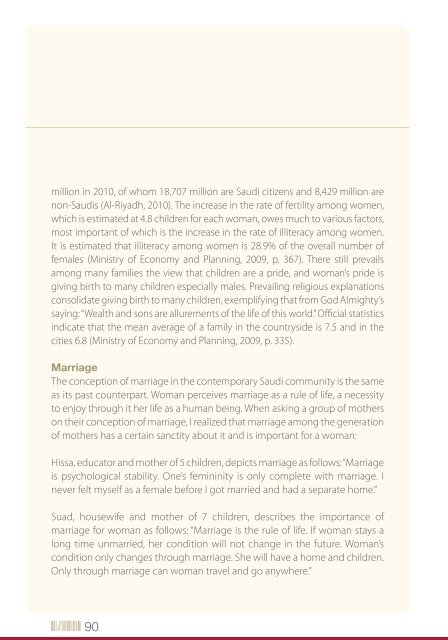General Supervisor
General Supervisor
General Supervisor
You also want an ePaper? Increase the reach of your titles
YUMPU automatically turns print PDFs into web optimized ePapers that Google loves.
million in 2010, of whom 18,707 million are Saudi citizens and 8,429 million are<br />
non-Saudis (Al-Riyadh, 2010). The increase in the rate of fertility among women,<br />
which is estimated at 4.8 children for each woman, owes much to various factors,<br />
most important of which is the increase in the rate of illiteracy among women.<br />
It is estimated that illiteracy among women is 28.9% of the overall number of<br />
females (Ministry of Economy and Planning, 2009, p. 367). There still prevails<br />
among many families the view that children are a pride, and woman’s pride is<br />
giving birth to many children especially males. Prevailing religious explanations<br />
consolidate giving birth to many children, exemplifying that from God Almighty’s<br />
saying: “Wealth and sons are allurements of the life of this world.” Official statistics<br />
indicate that the mean average of a family in the countryside is 7.5 and in the<br />
cities 6.8 (Ministry of Economy and Planning, 2009, p. 335).<br />
Marriage<br />
The conception of marriage in the contemporary Saudi community is the same<br />
as its past counterpart. Woman perceives marriage as a rule of life, a necessity<br />
to enjoy through it her life as a human being. When asking a group of mothers<br />
on their conception of marriage, I realized that marriage among the generation<br />
of mothers has a certain sanctity about it and is important for a woman:<br />
Hissa, educator and mother of 5 children, depicts marriage as follows: “Marriage<br />
is psychological stability. One’s femininity is only complete with marriage. I<br />
never felt myself as a female before I got married and had a separate home.”<br />
Suad, housewife and mother of 7 children, describes the importance of<br />
marriage for woman as follows: “Marriage is the rule of life. If woman stays a<br />
long time unmarried, her condition will not change in the future. Woman’s<br />
condition only changes through marriage. She will have a home and children.<br />
Only through marriage can woman travel and go anywhere.”<br />
90<br />
When I asked students about their conception of marriage, I realized that theirs<br />
and their mothers’ are not different. Their mothers think that marriage is an urgent<br />
economic, social, and cultural necessity since woman is in need of a man primarily<br />
to provide for her needs, form a family, and give birth to children. Likewise, today’s<br />
young lady desires marriage for social and psychological stability on condition<br />
that the husband is suitable, otherwise it is better for her to stay unmarried.<br />
Education and work offered woman other alternatives for a living. The social<br />
constraints imposed on woman may have a role to play in woman’s feeling that<br />
marriage is important, which can be grasped from some students’ wording:<br />
Suad, a student, explains her conception of marriage as follows: “For me,<br />
marriage is very important. If one of us does not marry, one will feel the others’<br />
looks asking one why one has not married so far. Certainly one presents a<br />
defect. Marriage assists me in proving myself.”<br />
Wafa, a student, thinks of the importance of marriage as follows: “Marriage is<br />
important for a young lady if the man is suitable. However, owing to cases of<br />
divorce these days, one has become scared of marriage. One says to oneself<br />
why marry today to divorce tomorrow. Let me stay in my father’ home among<br />
my family members duly respected and honored.”<br />
The most common kind of marriage in the traditional Saudi community is<br />
marriage within the family, especially cross-cousin marriage. In the modern<br />
Saudi community, there is a tendency to marry from outside the family.<br />
However, cross-cousin marriage is still practiced in the modern Saudi<br />
community alongside marriage from outside the family.<br />
Polygamy<br />
In the past, polygamy used to be restricted to tribes’ sheiks and rich merchants<br />
only (Al-Khateeb, 1982). With the discovery of oil and urban development,<br />
91


